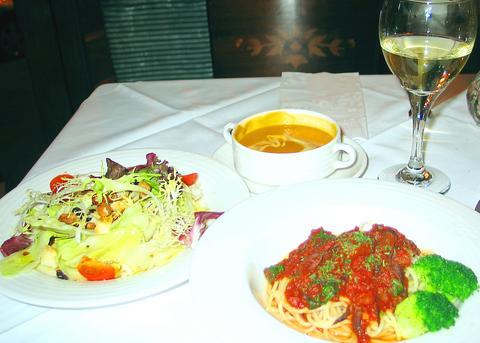When local media reported last week that 70 percent of Taipei's vegetarian restaurants were using animal byproducts in their food, it was reminiscent of the UK scandal a decade ago when a consumer discovered pork in their Linda McCartney brand veggie sausages. While a lot of vegetarian food prides itself on having the same consistency, smell and taste as meat, many vegetarians are uneasy about eating substitutes that taste like the real thing -- and past and present transgressions suggest why.
For strict vegetarian cuisine, with a selection of non-dairy items to satisfy a picky vegan, Tianmu French Style Vegetarian restaurant offers pricey western fare that doesn't look, smell or taste anything like meat.

PHOTO: DIANA FREUNDL, TAIPEI TIMES
Owner and chef, Lien Yu-lan (連玉蘭) learned how to cook from a non-vegetarian French national living in Taipei. Being a vegetarian herself, Lien said she would experiment with different ingredients to create the meatless dishes she serves today. Since the opening of her restaurant four years ago, she has passed on the recipes to her daughter, Lien Pei-Lu (連珮如), and now the mother-daughter team spends quality time in the kitchen inventing meatless dishes.
suggests, and more Mediterranean offering a large selection of pastas, soups and salads. With summer on its way, a variety of salads including avocado salad (NT$350), and mixed nut salad (NT$300) among others make a nice light lunch, and with an appetizer such as roasted bell peppers (NT$350), or mozzarella in balsamic sauce (NT$300), it could be a simple dinner. For a more substantial meal there are a choice of three set meals that include appetizer, soup, salad, main entree, fruit plate and tea or coffee (NT$550 to NT$980).
The best item is the complementary freshly baked bread. You'll need the bread if you order the pumpkin soup, which is sweet and tastes more like a dessert than a starter. The nut salad is full of flavor and comes with a tangy house dressing.
For desert there is an assortment of cakes, ice cream and yogurt smoothies, or a chocolate fondue (NT$480) made with homemade chocolate. The drink list includes a good selection of alcoholic and non-alcoholic beverages with a nice, but small bottle of Chilean white wine (NT$500).
The interior is tasteful, the white textured walls with dark trim compliment the antique furniture. The dim lighting and jazz music give it a romantic atmosphere making it the perfect place to take a generous date.

The depressing numbers continue to pile up, like casualty lists after a lost battle. This week, after the government announced the 19th straight month of population decline, the Ministry of the Interior said that Taiwan is expected to lose 6.67 million workers in two waves of retirement over the next 15 years. According to the Ministry of Labor (MOL), Taiwan has a workforce of 11.6 million (as of July). The over-15 population was 20.244 million last year. EARLY RETIREMENT Early retirement is going to make these waves a tsunami. According to the Directorate General of Budget Accounting and Statistics (DGBAS), the

Last week the story of the giant illegal crater dug in Kaohsiung’s Meinong District (美濃) emerged into the public consciousness. The site was used for sand and gravel extraction, and then filled with construction waste. Locals referred to it sardonically as the “Meinong Grand Canyon,” according to media reports, because it was 2 hectares in length and 10 meters deep. The land involved included both state-owned and local farm land. Local media said that the site had generated NT$300 million in profits, against fines of a few million and the loss of some excavators. OFFICIAL CORRUPTION? The site had been seized

Next week, candidates will officially register to run for chair of the Chinese Nationalist Party (KMT). By the end of Friday, we will know who has registered for the Oct. 18 election. The number of declared candidates has been fluctuating daily. Some candidates registering may be disqualified, so the final list may be in flux for weeks. The list of likely candidates ranges from deep blue to deeper blue to deepest blue, bordering on red (pro-Chinese Communist Party, CCP). Unless current Chairman Eric Chu (朱立倫) can be convinced to run for re-election, the party looks likely to shift towards more hardline

Sept. 15 to Sept. 21 A Bhutanese princess caught at Taoyuan Airport with 22 rhino horns — worth about NT$31 million today — might have been just another curious front-page story. But the Sept. 17, 1993 incident came at a sensitive moment. Taiwan, dubbed “Die-wan” by the British conservationist group Environmental Investigation Agency (EIA), was under international fire for being a major hub for rhino horn. Just 10 days earlier, US secretary of the interior Bruce Babbitt had recommended sanctions against Taiwan for its “failure to end its participation in rhinoceros horn trade.” Even though Taiwan had restricted imports since 1985 and enacted